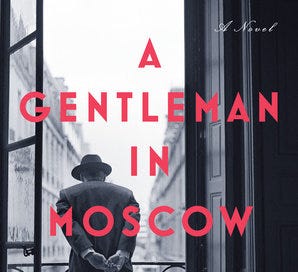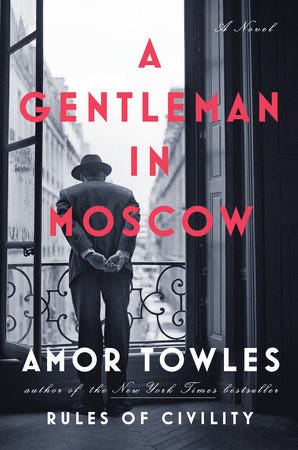Date read: June 2022
Date published: September 2016
Summary
In 1922, Count Alexander Rostov is deemed an unrepentant aristocrat by a Bolshevik tribunal, and is sentenced to house arrest in the Metropol, a grand hotel across the street from the Kremlin. Rostov, an indomitable man of erudition and wit, has never worked a day in his life, and must now live in an attic room while some of the most tumultuous decades in Russian history are unfolding outside the hotel’s doors. Unexpectedly, his reduced circumstances provide him entry into a much larger world of emotional discovery. Brimming with humor, a glittering cast of characters, and one beautifully rendered scene after another, this singular novel casts a spell as it relates the count’s endeavor to gain a deeper understanding of what it means to be a man of purpose. (via Goodreads)
My Take
I’ll tell you this up front—I love Amor Towles. I read The Lincoln Highway, then immediately read Rules of Civility, and have since devoured the new Table for Two. But this book, A Gentleman in Moscow, is about as close to a perfect novel as you can get.
On its face, the story is historical fiction, about a political prisoner, Russian Count Alexander Ilyich Rostov, who is under house arrest at a fancy hotel in Moscow after the Bolsheviks find him guilty of being a “social parasite.”
But the book is so much more. In a sense, the main character is the Metropol Hotel, where the Count is sent to the attic to live. As the New York Times review states, “If the hotel contains the world, Towles assiduously offers pleasures and lessons, room by room, as a reborn Rostov bears witness to his era.”
With this setting and era, you’d think this would be a dark, brooding, possibly sad and violent story. But this book, buoyed by a main character who can’t avoid his own positivity, carries a prevailing sense of lightness. Over the course of several decades, the Count shares wisdom, insight, history, and love—and channels that into his life that seems cramped, but is actually bountiful, generous, and optimistic.
The crux of the plot is introduced almost in passing, as a young girl, Nina, shows up at the hotel and is need of a friend. The Count begrudgingly acknowledges that he, too, is in need of a friend. While initially a nuisance, the Count eventually sees Nina as a protege, a pupil, and a dear friend. It’s a beautiful and symbiotic relationship.
Throughout the book, we get detailed accounts of the Count’s fancy meals, excellent wine, and interactions with the guests and workers at the hotel. We get a portrait of privilege, but also one of thoughtful consideration of every detail of life.
“For his part, the Count had opted for the life of the purposefully unrushed. Not only was he disinclined to race toward some appointed hour - disdaining even to wear a watch - he took the greatest satisfaction when assuring a friend that a worldly matter could wait in favor of a leisurely lunch or stroll along the embankment. After all, did not wine improve with age? Was it not the passage of years that gave a piece of furniture its delightful patina? When all was said and done, the endeavors that most modern men saw as urgent (such as appointments with bankers and the catching of trains), probably could have waited, while those they deemed frivolous (such as cups of tea and friendly chats) had deserved their immediate attention.”
The exchanges between the Count and other characters, particularly in the restaurant and bar, are things to be pondered and appreciated.
“One must make ends meet,' confirmed Audrius matter-of-factly, 'or meet one's end.'
Richard studied the bartender for a moment.
'Well, that's the very essence of it, isn't it?”
The only real weight of the revolution happening outside is through the Count’s old friend, a poet, Mishka, who keeps the Count in the loop on things like censorship, the lack of free speech, and the disappearance of parts of the good life.
The Count’s friendship with Nina, which is a parental relationship, is what drives the plot and the ending. As the New York Times review states: “What saves the book is the gorgeous sleight of hand that draws it to a satisfying end, and the way he chooses themes that run deeper than mere sociopolitical commentary: parental duty, friendship, romance, the call of home. Human beings, after all, “deserve not only our consideration but our reconsideration” — even those from the leisured class. Who will save Rostov from the intrusions of the state if not the seamstresses, chefs, bartenders and doormen? In the end, Towles’s greatest narrative effect is not the moments of wonder and synchronicity but the generous transformation of these peripheral workers, over the course of decades, into confidants, equals and, finally, friends. With them around, a life sentence in these gilded halls might make Rostov the luckiest man in Russia.”
The ending ties everything together so perfectly, so delightfully, that you look back and realize that you’ve spent this entire story inside of a hotel, but you come away feeling your heart and soul expanded.
My Rating
9/10 — Banger





